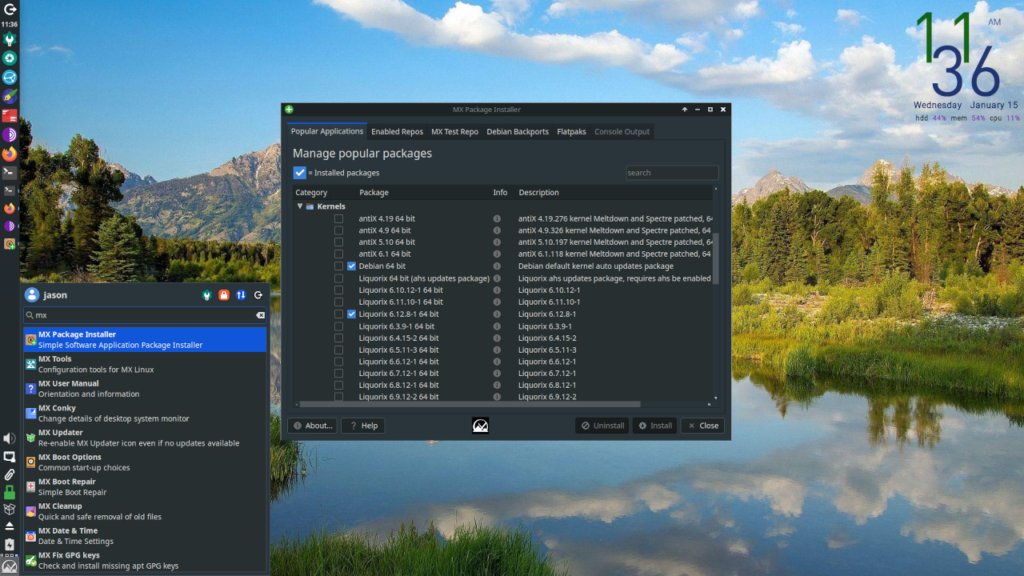I thought I’d try out MX Linux’s new version along with the new XFCE 4.20, and I’ve really enjoyed it this morning. And it is supported by VMware Workstation 3D graphical acceleration. Also, the installer recognizes it’s being installed in VMware and installs open-vm-tools automatically. And MX Linux has quite a few utilities like the MX Package Manager that makes installing newer kernels easy, though they support the Liquorix kernel, and I’ll probably add the Xanmod kernel repository to use it (my favorite I support with Bitcoin). Consequently, they offer a custom version of Mullvad VPN because the default MX Linux doesn’t use systemd, but sysVinit. You can change to systemd if you prefer as it’s present and just needs to be picked from the boot options, or use MX Boot Options to make it the default. If you switch to systemd you can use the Mullvad repository and their distributed version instead of the customized MX Linux version for sysVinit. Also, MX Linux includes Nala by default, which is an excellent front end for apt that looks similar to dnf if you’ve used Fedora (be sure to edit /etc/nala/nala.conf to your preferences). There is a lot more here to go over and why this is such a popular Linux distribution, and I would be content using this as my main Linux distribution even with XFCE (KDE version is available or can be installed later).

This is the fifth stable update for MX Linux 23 “Libretto” and it’s based on the Debian GNU/Linux 12.9 “Bookworm” repositories.
By Marius Nestor

MX Linux 23.5 has been released today as the newest ISO snapshot in the MX Linux 23 “Libretto” series of this lightweight Debian-based GNU/Linux distribution for everyday use.
Based on the Debian 12.9 repositories, the MX Linux 23.5 release introduces the latest and greatest Xfce 4.20 desktop environment, which is also available from MX Linux’s repositories for existing users using the Xfce and Raspberry Pi editions. One of the biggest features of Xfce 4.20 is experimental Wayland support.
In addition, MX Linux 23.5 introduces several new applications in MX Linux’s “test” repository, adds various UI improvements and better support for packages in third-party repositories to MX Packageinstaller, and brings extra warnings on the live system if persistence has been asked for on a read-only boot media.
On top of that, this release updates the installer by tweaking the default fstab file generated during the installations and implementing additional fallback modes. As expected, there are many bug fixes and updated language translations.
As expected, MX Linux 23.5 updates the AHS (Advanced Hardware Support) edition with updated firmware packages and a newer kernel, namely Linux kernel 6.12.8, as a Liquorix flavor for uncompromised responsiveness. This is useful for those experiencing hardware issues with the standard Linux 6.1 LTS kernel.
Check out the release announcement page for more details, from where you can download the live and installable ISO images of MX Linux 23.5 in the usual Xfce, KDE Plasma, Fluxbox, and Raspberry Pi editions for 32-bit and 64-bit hardware architectures with Linux kernel 6.1 LTS or Linux kernel 6.12 LTS (AHS and KDE Plasma editions only).
Of course, existing MX Linux 23 “Libretto” users don’t need to download the new ISO release to keep their installations up to date, but only to run the sudo apt update && sudo apt full-upgrade commands in the Terminal app or use a graphical package manager like Synaptic Package Manager.